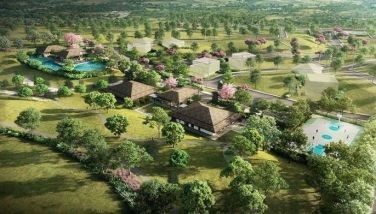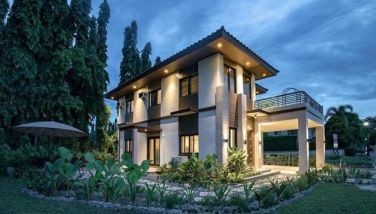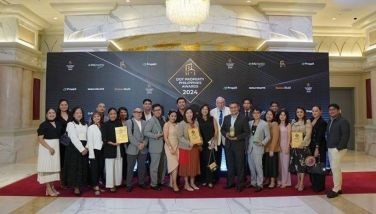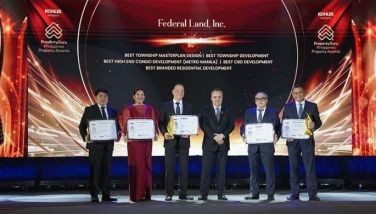Philippines’ bridge program is Papua New Guinea’s working model
December 29, 2001 | 12:00am
President Arroyo’s bridge program scores a global first in bridge construction history by becoming the model for another country’s bridge program.
The President’s Bridge Program, which has linked thousands of communities at record speed, shall be adopted by Papua New Guinea’s National Bridge Programme, called "YuMiYet (You and Me Together) Bridges."
Papua New Guinea is a country of varied topography and is located north of Australia. Top officials, led by Minister for Finance and Planning Andrew Kumbakor, recently flew to Manila to sign a loan agreement with Mabey and Johnson, Ltd. and Deutsche Bank (UK), Ltd., to finance the construction of up to 116 bridges under the "YuMiYet Bridges" program. Minister Kumbakor had seen how the President’s Bridge Program works in an earlier trip to the Philippines.
During the signing ceremonies, Minister Kumbakor cited the bridge technology and job generation features of the Philippines’ infrastructure program, which were sorely lacking in the other bridge construction projects undertaken in his country. "To date, our bridges are dependent on foreign consultants, and they take so long to finish," the Finance Chief points out.
The Philippine’s President’s Bridge Program uses bridging technology from UK-based Mabey & Johnson, Ltd., whose modular design allows construction to be completed at the rate of one bridge in four days, and using local labor as part of the total manpower complement. Its technology also makes its steel bridges last for at least 50 years, with little or no maintenance at all. Because of their standard design, too, little expensive consultancy is required, if at all.
Mabey and Johnson is supplier of bridging to no less than Britain’s Armed Forces and international organizations such as the United Nations and the North Atlantic Treaty Organization. In the Philippines, it had been contracted to build over 1,300 bridges for the President’s Bridge Program – from Cagayan and Ilocos Norte in the North, to Tawi-Tawi in the South. Statistics show increased trade always results within months of completion of a bridge.
Each bridge, too, brought more than economic gains. Mabey and Johnson, Ltd.’s Director General – Asia and the Pacific, David Forsyth, recalls how the bridges brought hope to Filipino folks. "There was much excitement all over town – from the children who look forward to a shorter, safer walk to school, to the rural health workers who became more confident of quickly responding to emergencies."
These experiences inspired Papua New Guinea’s officials to pattern their bridge program after the Philippines.’ "We are a young country and we can learn a lot from the Philippines," says Minister Kumbakor. The Independent State of Papua New Guinea was established only in 1975.
"Our people also have to cross river and valleys to bring their produce to market, or to get emergency medical center," he adds.
Even before the bridge programs, the Philippines and Papua New Guinea had shared similarities, not only in topography, but also in history. Both countries fought with the Allied Forces and suffered heavy destruction during World War II. Papua New Guinea’s Port Moresby even served as General Douglas MacArthur’s temporary headquarters, before he returned to the Philippines to lead the war against the Japanese.
BRIDGE DEAL. President Gloria Macapagal-Arroyo’s President’s Bridge Program inspired the Independent State of Papua New Guinea to launch a national bridge programme of its own, using the same bridging technology from UK’s Mabey and Johnson, Ltd. The bridge builder’s Asia-Pacific headquarters in Manila hosted the signing of the loan agreement between Papua New Guinea and Deutsche Bank (UK), Ltd. Above, Papua New Guinea Minister for Finance and Planning Andrew Kumbakor (2nd from right) and Deutsche Bank (UK), Ltd. vice president Piers Constable seal the deal with a handshake, as Papua New Guinea Secretary for Finance Vele Iamo (extreme right) and Mabey and Johnson, Ltd. Director General – Asia and the Pacific, David Forsyth, look on.
The President’s Bridge Program, which has linked thousands of communities at record speed, shall be adopted by Papua New Guinea’s National Bridge Programme, called "YuMiYet (You and Me Together) Bridges."
Papua New Guinea is a country of varied topography and is located north of Australia. Top officials, led by Minister for Finance and Planning Andrew Kumbakor, recently flew to Manila to sign a loan agreement with Mabey and Johnson, Ltd. and Deutsche Bank (UK), Ltd., to finance the construction of up to 116 bridges under the "YuMiYet Bridges" program. Minister Kumbakor had seen how the President’s Bridge Program works in an earlier trip to the Philippines.
During the signing ceremonies, Minister Kumbakor cited the bridge technology and job generation features of the Philippines’ infrastructure program, which were sorely lacking in the other bridge construction projects undertaken in his country. "To date, our bridges are dependent on foreign consultants, and they take so long to finish," the Finance Chief points out.
The Philippine’s President’s Bridge Program uses bridging technology from UK-based Mabey & Johnson, Ltd., whose modular design allows construction to be completed at the rate of one bridge in four days, and using local labor as part of the total manpower complement. Its technology also makes its steel bridges last for at least 50 years, with little or no maintenance at all. Because of their standard design, too, little expensive consultancy is required, if at all.
Mabey and Johnson is supplier of bridging to no less than Britain’s Armed Forces and international organizations such as the United Nations and the North Atlantic Treaty Organization. In the Philippines, it had been contracted to build over 1,300 bridges for the President’s Bridge Program – from Cagayan and Ilocos Norte in the North, to Tawi-Tawi in the South. Statistics show increased trade always results within months of completion of a bridge.
Each bridge, too, brought more than economic gains. Mabey and Johnson, Ltd.’s Director General – Asia and the Pacific, David Forsyth, recalls how the bridges brought hope to Filipino folks. "There was much excitement all over town – from the children who look forward to a shorter, safer walk to school, to the rural health workers who became more confident of quickly responding to emergencies."
These experiences inspired Papua New Guinea’s officials to pattern their bridge program after the Philippines.’ "We are a young country and we can learn a lot from the Philippines," says Minister Kumbakor. The Independent State of Papua New Guinea was established only in 1975.
"Our people also have to cross river and valleys to bring their produce to market, or to get emergency medical center," he adds.
Even before the bridge programs, the Philippines and Papua New Guinea had shared similarities, not only in topography, but also in history. Both countries fought with the Allied Forces and suffered heavy destruction during World War II. Papua New Guinea’s Port Moresby even served as General Douglas MacArthur’s temporary headquarters, before he returned to the Philippines to lead the war against the Japanese.
BRIDGE DEAL. President Gloria Macapagal-Arroyo’s President’s Bridge Program inspired the Independent State of Papua New Guinea to launch a national bridge programme of its own, using the same bridging technology from UK’s Mabey and Johnson, Ltd. The bridge builder’s Asia-Pacific headquarters in Manila hosted the signing of the loan agreement between Papua New Guinea and Deutsche Bank (UK), Ltd. Above, Papua New Guinea Minister for Finance and Planning Andrew Kumbakor (2nd from right) and Deutsche Bank (UK), Ltd. vice president Piers Constable seal the deal with a handshake, as Papua New Guinea Secretary for Finance Vele Iamo (extreme right) and Mabey and Johnson, Ltd. Director General – Asia and the Pacific, David Forsyth, look on.
BrandSpace Articles
<
>
- Latest
Latest
Latest
October 23, 2024 - 9:30am
By May Dedicatoria | October 23, 2024 - 9:30am
October 10, 2024 - 11:30am
October 10, 2024 - 11:30am
October 5, 2024 - 12:08pm
October 5, 2024 - 12:08pm
September 24, 2024 - 1:00pm
September 24, 2024 - 1:00pm
September 13, 2024 - 4:00pm
September 13, 2024 - 4:00pm
September 9, 2024 - 9:45am
September 9, 2024 - 9:45am
Recommended






























